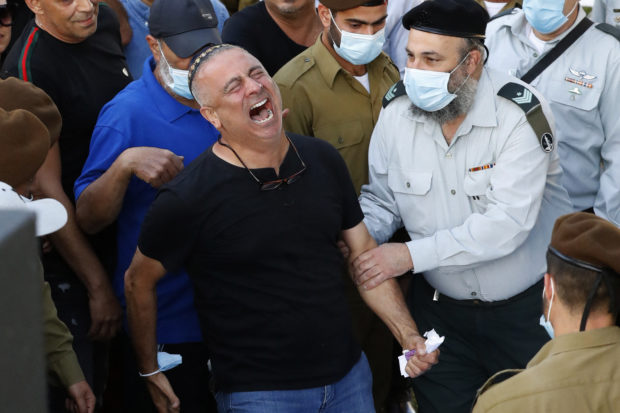
In this file photo taken on May 12, 2020, Baruch Ben Ygal reacts during the funeral of his son Amit Ben Ygal, a 21-year-old Israeli army soldier who was killed in the village of Yaabed near the West Bank city of Jenin, at the Beer Yaakov military cemetery near Tel Aviv. AFP
RAMAT GAN, Israel — Two years since Israeli soldier Amit Ben Ygal — an only child — died in service, his father has not given up hope of becoming a grandfather.
For now posthumous in vitro fertilization (IVF) rights are reserved only for the widows of fallen soldiers in Israel.
But a draft law seeks to expand such rights to their parents, with an activist insisting Israel has a “moral obligation” to families whose children died in service.
“Amit was everything in my life,” father Baruch, 53, told AFP. “I want to be happy again… The army has a responsibility to help me become a grandfather.”
His 21-year-old son was struck in the head by a stone hurled at him by a Palestinian during an Israeli military raid in the occupied West Bank on May 12, 2020.
The father had sperm extracted within 72 hours of his son’s killing, quick enough for it to be frozen and remain viable for IVF.
He plans to use the late son’s sperm to produce a grandchild with a female volunteer, but cannot do so until lawmakers approve the bill, which passed its first hurdle in parliament but has also raised ethical concerns.
Ben Ygal and Amit’s mother were divorced. The father and son lived together in the Tel Aviv suburb of Ramat Gan, where Amit’s room has been transformed into a mausoleum.
Baruch told AFP that “it’s hard to say ‘he died’. I can say it for my father, but not for Amit.”
Photos and sketches of Amit cover every inch of the walls, and on the bed, his father laid T-shirts bearing his son’s image and the front page of a newspaper showing the mourning father posing with dozens of babies named Amit in his honor.
Ben Ygal said that to fill the emptiness, he wanted to host “one or two babies from Amit” on Shabbat and Jewish holidays.
‘Hero father’
Zvi Hauser, the right-wing lawmaker who drafted the legislation named after the Hebrew word for “continuity”, told AFP the state owes the proposed change to soldiers’ families.
“If someone is killed in a car accident, (it was) you who decided to be on the road. If you’re killed in the army, the army decided you’ll be there.”
He said concerns about this unusual path to parenthood can be mitigated through strict consent forms offered to soldiers when they enlist and by carefully managing a roster of volunteer mothers.
Irit Oren Gunders, who heads an organization that supports relatives of soldiers killed in service, has backed the initiative.
“The country has a moral obligation to the child and to his parents who… educated him and told him to go to the military in order to protect the country,” she told AFP.
Oren Gunders said many women pursue pregnancies with scant information about sperm donors, and that the “continuity” bill could “create a win-win situation”.
“They will be able to tell the children about their hero father who fought for this country.”
‘Ethical problem’
The bill easily cleared its first vote last month, but the two remaining votes will have to wait until after a new parliament is elected when Israel goes to the polls next month.
Hauser is not running for re-election in the November 1 vote — Israel’s fifth in less than four years.
Unease about the proposed legislation remains widespread, notably from rabbis.
Binyamin David, of the rabbinical family planning institute Puah, warned that the draft law appeared focused on the aspirations of mourning parents — not soldiers.
He said he understood parents’ “pain”, but that there was an “ethical problem” with what he called using a child “as a memorial” to their fallen father.
There is no guarantee that Amit Ben Ygal would have wanted to have a child with a woman he did not know, David stressed.
Baruch Ben Ygal told AFP that his son wanted children and had a girlfriend when he was killed but that she is not yet ready for children.
The father said he needed a grandchild “to continue to live”, adding that he had been contacted by hundreds of women willing to attempt IVF with Amit’s sperm.
Gesturing to his half-empty apartment, he said, “I know that if my grandchildren will be here after I go, I will go being very happy.”
RELATED STORIES
No laboratory in PH is allowed to destroy excess embryos
Discarding ‘excess’ human embryos violate constitution